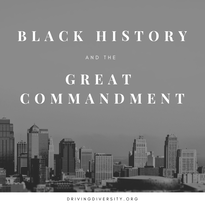 I don’t remember learning about Black History Month while growing up. The first time it hit home for me was while I was attending a multi-ethnic church in Oakland a few years ago. Each Sunday for the month of February, one of the worship leaders got up and told us about famous Black people who accomplished incredible things. Inventors, leaders, world changers. These were all people I had never heard about before. I wondered why no one ever bothered to tell me about the enormous contributions Black men and women had made to our society aside from Dr. King and Rosa Parks. Today as I reflect upon these things I realize that learning about the past is not enough. Here I am with a college degree in history and I can barely name more than a handful of pre-Civil Rights historical figures that are also Black Americans. Knowing the history is important, but I’m also fully aware that in my city we have an ongoing struggle for equality happening every day. In the city where my daughter goes to school, Black students are suspended six times as often as White students. Are Black students six times as bad? Of course not. According to Dr. Edwin Bell, a professor at Winston-Salem State University, the research indicates that this disparity exists despite similar levels of misbehavior and across income levels. In other words, it's not a poverty issue. It's a racial and cultural issue. How in 2019 can we still be content with the way things are? How does Black History inform us about how change happens and what possibilities exist in the future? Is it our responsibility as Christians to do something about the problems in our world or to simply preach the gospel and wait until Christ’s return? I believe people cannot move to action until they first move to awareness. But that cannot happen if their racial education remains confined to the shortest month of the year. For Black History Month, we must not only learn from the past but also become fully aware of the current moment and how faith communities can start exercising a greater civic responsibility. Or to put it another way, the Great Commission is never separate from the Great Commandment. 3/19/2019 01:09:42 am
Originally, Apple introduced shapes as graphic elements that could be added to your presentations. The basic shapes feature now has been greatly expanded to include thirteen additional themes: Objects, Animals, Nature, Food, Symbols, Education, Arts, Science, People, Places, Activities, Transportation, and Work. Comments are closed.
|
Categories
All
Contributing Authors
|

 RSS Feed
RSS Feed